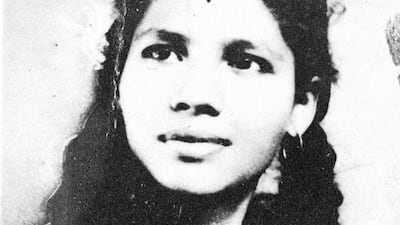NEW DELHI // Aruna Shanbaug, a nurse who spent more than four decades in a vegetative state and became the focus of a debate over India’s euthanasia laws, died yesterday morning at the age of 67.
Shanbaug was on duty at the King Edward Memorial (KEM) Hospital in Mumbai in 1973 when a janitor raped and then strangled her with a length of chain, leaving her for dead.
Although Shanbaug survived, the strangulation had cut off oxygen to her brain, causing permanent damage and rendering her blind. She remained in a vegetative state for 42 years, being fed mashed food by her former colleagues at the hospital.
Over the past six days, Shanbaug developed pneumonia, and although she was treated in the hospital’s intensive care unit, she could not fight off the infection.
At the time of the crime, when it still seemed possible Shanbaug might recover, the hospital’s administrators tried to conceal the fact she was raped, owing to the stigma surrounding sexual assault victims.
Instead, they pressed charges of robbery and attempted murder against the janitor, Sohanlal Walmiki.
He was convicted and sentenced to seven years in prison in 1974. After serving his term, Walmiki changed his name and has been not been heard of since.
But Shanbaug continued to live through the effects of her ordeal, not even aware that she was ageing or that her parents had died and she had been abandoned by her extended family. Doctors pronounced, within a year of the crime, that she had no hope of recovery; this was also when it emerged that she had been raped.
Her tragic situation entranced and enraged the nation.
In 2009, Pinki Virani, a Mumbai-based journalist and author of the book Aruna's Story, filed a petition in the supreme court asking that Shanbaug not be fed any more, allowing her to die peacefully.
Shanbaug “is kept in this persistent vegetative state by the hospital authorities by feeding her mashed food, which she can hardly digest”, Virani’s petition said. “She cannot speak, hear or see, there is no element of human life in her body.”
Being kept alive in this manner, the “continued vegetative existence of Aruna is in violation of her right to live in dignity”, the petition added.
The court rejected the petition in 2011, arguing that Virani was not close enough to Shanbaug to make this plea on her behalf. Shanbaug’s “next friend” – the party closest to her – was the staff of the hospital who wished to keep her alive, the court said.
The judges also observed that if doctors and hospitals were given a free hand with euthanasia, that freedom “may always be misused by some unscrupulous persons who wish to inherit or otherwise grab the property of the patient”.
But, in a landmark move, the same judgment also legalised “passive euthanasia”, in which the parents, spouse, or other close relatives or “next friends” of a suffering or terminal patient can apply to a high court to withhold life support.
The judgment made a distinction between this and “active euthanasia”, in which the patient is administered a lethal injection or drug to hasten death.
Although this decision did not end Shanbaug’s life, because her “next friend”, the KEM Hospital, did not file for her to be passively euthanised, it was hailed as a step forward in India’s medical laws.
"In its judgment, the court has struck a fine balance – it has shown great sensitivity in handling the heart-rending case of Aruna Shanbaug and her wonderful 'next friend', the KEM Hospital staff, taken a progressive and empathetic view about dying with dignity, but subjected it to exacting and rigorous procedures," The Hindu newspaper wrote in an editorial soon after the verdict.
Shanbaug’s death triggered a wave of sympathetic messages. “My deepest condolences on the sad demise of Aruna Shanbaug,” said Devendra Fadnavis, head of Maharashtra state’s government. “It was painful to see her suffering. I salute the humanity shown by KEM nurses.”
ssubramanian@thenational.ae

